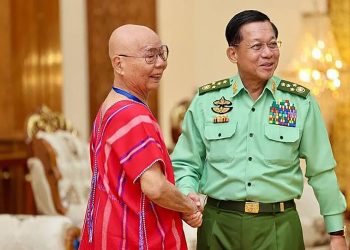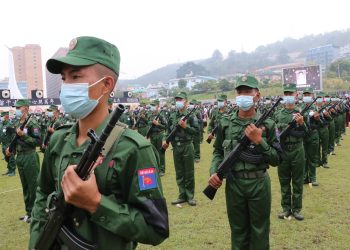NAYPYITAW — The United Wa State Army (UWSA), the biggest armed ethnic group in Myanmar, still has concerns over possible future scenarios if it were to sign the Nationwide Ceasefire Agreement (NCA), said former Lieutenant-General U Khin Zaw Oo, secretary of the government’s Peace Commission.
“They don’t categorically reject the NCA, but they seem to have some concerns over what might happen after signing it. But it is fair to say that they have basically accepted the NCA,” U Khin Zaw Oo said.
The commission plans to visit northeastern Myanmar and assuage their concerns, he added.
The leaders of the Federal Political Negotiation and Consultative Committee (FPNCC), a bloc of seven ethnic armed groups based along the northeastern China-Myanmar border led by the UWSA, met State Counselor Daw Aung San Suu Kyi and Myanmar Army (or Tatmadaw) Chief Senior-General Min Aung Hlaing last week on the sidelines of the third session of the Union Peace Conference in Naypyitaw.
The FPNCC consists of the UWSA, the Mongla-based National Democratic Alliance Army, the Kachin Independence Army (KIA), the Shan State Progress Party, the Ta’ang National Liberation Army (TNLA), the Arakan Army (AA), and the Myanmar National Democratic Alliance Army (MNDAA).
The UWSA said in a statement that it would consider signing the NCA if the government and Tatmadaw made a written promise that it would be allowed, after signing the NCA, to introduce changes to the agreement and have the option of resigning from it.
Government spokesperson U Zaw Htay said the NCA does not include a provision on resignation, but according to Section 27, the signatories and the government can negotiate issues not covered by the agreement.
“They prepared that statement some months ago. And we’re negotiating with them regarding the statement. At the previous meeting in June, we told them we can give them what they want within the NCA framework. They said they would consider it at their central executive committee,” U Khin Zaw Oo said.
The FPNCC claims it is not a military alliance, but a political bloc formed to hold peace talks with the government and the Tatmadaw.
When asked by The Irrawaddy, U Khin Zaw Oo said he believed the government would be able to make peace with those groups before 2020.
“We believe we will achieve peace by 2020, so we’re doing our best. But there are two sides. It will not be possible if only one side has political will,” he said.
Myanmar is grateful to China for convincing the seven groups to travel to Naypyitaw for the conference, he said, adding that border stability is in the mutual interest of both countries.
The Tatmadaw previously labeled the AA, MNDAA and TNLA as insurgent groups, saying they were formed after Myanmar’s democratic government took power in 2010. But it is now considering allowing them to join the NCA on condition they promise to give up armed struggle.
“The Tatmadaw has changed its attitude since 2016. It no longer talks about disarmament in meetings with the three groups, but instead asks them to commit to giving up the armed struggle at some point in the future,” Dr. Min Zaw Oo, who has actively participated in Myanmar’s peace process, told The Irrawaddy.
Last week, deputy army chief Vice Senior-General Soe Win met with the AA, MNDAA and TNLA, while Snr-Gen Min Aung Hlaing received the leaders of the other four FPNCC groups.
The FPNCC delegates, being non-signatories of the NCA, attended the third session of the Union Peace Conference as observers.
Translated from Burmese by Thet Ko Ko.

















